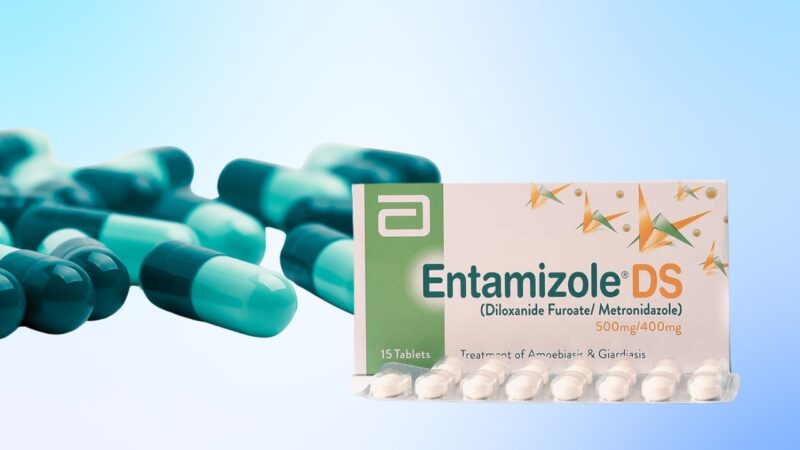Entamizole works by targeting and killing bacteria and parasites, which are often the culprits behind gastrointestinal discomfort. This makes this drug particularly effective for treating conditions like amoebiasis and certain bacterial infections.
Users may experience some mild side effects, including nausea, vomiting, and headaches. These side effects are generally self-resolving and often outweigh the benefits of pain relief.
To further mitigate stomach pain, individuals can also consider supplementary methods such as applying a heating pad or consuming clear fluids. Entamizole offers a targeted approach, making it a valuable option for those seeking relief from persistent stomach issues.
Pharmacological Classification

Entamizole belongs to the class of medications known as antiprotozoals according to NCBI. These drugs are designed to treat infections caused by protozoa, which are single-celled organisms often responsible for gastrointestinal infections. By targeting the protozoal pathogens, Entamizole helps alleviate symptoms like nausea, vomiting, and diarrhea.
This medication also shows properties typical of antibacterial agents, making it useful in scenarios where bacterial infections coincide with protozoal infections. Its dual-action capability helps reduce inflammation and pain in the stomach, thereby improving patient comfort as per Sydney Gut Clinic.
Key Attributes
- Class: Antiprotozoal
- Secondary Action: Antibacterial
Active Constituents and Their Roles
Its effectiveness is largely attributed to its active ingredient, metronidazole, which is a nitroimidazole antibiotic.
Metronidazole disrupts the DNA of microbial cells, inhibiting their replication and ultimately leading to their demise. This action reduces the concentration of harmful organisms in the gastrointestinal tract, relieving symptoms according to Science Direct.
In addition to metronidazole, the formulation may contain excipients, substances included to enhance the efficacy or stability of the active ingredient. For instance, ingredients like cellulose or lactose might be added to improve the drug’s absorption and bioavailability.
Key Constituents
- Metronidazole: Inhibits DNA synthesis of pathogens
- Excipients: Enhance drug absorption and stability.
Use in Pediatrics
The medication may cause more pronounced side effects in children due to their developing bodies. Pediatric dosages need to be carefully calculated based on weight and age to avoid overdose or adverse reactions like nausea or headaches.
It is also essential to monitor children closely for any signs of allergic reactions.
Dry mouth, diarrhea, and loss of appetite are commonly reported side effects in pediatric usage.
Considerations for the Elderly
In elderly patients, Entamizole requires careful administration due to the higher likelihood of pre-existing health conditions and potential drug interactions. Older adults are more susceptible to dizziness, headache, and other neurological side effects. This is particularly important to consider in patients with balance issues, as dizziness could increase the risk of falls.
Furthermore, the metabolism of medications can slow down with age, requiring dosage adjustments to prevent toxicity. Regular monitoring of blood counts is advisable since rare occurrences of leukopenia have been reported as per a study of PMC.
Proper hydration and dietary adjustments can also help mitigate gastrointestinal side effects such as nausea and epigastric pain according to studies.
Side Effects
Actions
Dry Mouth
Increase fluid intake
Nausea/Vomiting
Take medication with food
Loss of Appetite
Monitor weight, eat small meals
Headache/Dizziness
Rest, avoid strenuous activity
Diarrhea
Stay hydrated
Itchiness/Skin Reactions
Consult a healthcare provider immediately
Antimicrobial Effects
Entamizole exerts its antimicrobial effects by disrupting the DNA structure of anaerobic bacteria such as Clostridium and Bacteroides. It works by diffusing into the bacterial cells and inducing strand breakage in the DNA helix, effectively inhibiting nucleic acid synthesis.
This prevents bacterial replication, leading to the death of the bacteria and the reduction of symptoms like bloating and gastrointestinal pain.
Antiprotozoal Activity

The antiprotozoal activity of Entamizole is centered around its ability to combat protozoan parasites like Entamoeba histolytica. This is achieved through the drug’s capacity to inhibit protozoan DNA synthesis, leading to the organism’s death.
Entamoeba histolytica, responsible for amoebic colitis, can cause severe abdominal pain and diarrhea. By targeting and eliminating these protozoa, Entamizole helps in preventing the associated complications like bowel wall injury and intestinal hemorrhage as it is stated by Richard L. Austin.
Its effectiveness in eradicating protozoa makes Entamizole an essential medication in environments where amoebic infections are prevalent. This contributes significantly to reducing the morbidity associated with these infections.
Impact on Gut Flora
While Entamizole targets harmful bacteria and protozoa, it also impacts the gut flora. The alteration of gut microbiota can lead to changes in digestive health. Entamizole specifically reduces the number of pathogenic microorganisms while having a minimal effect on beneficial gut bacteria.
Maintaining a balanced gut flora is crucial for digestive health and overall well-being. The selective action of Ornidazole ensures that the beneficial bacteria remain relatively unaffected, thereby minimizing potential side effects such as diarrhea or bloating says Divakar Dahiya.
Side Effects and Precautions

Common Adverse Reactions
Patients using Entamizole might experience gastrointestinal issues such as nausea, vomiting, and diarrhea. There are also reports of stomach pain and a loss of appetite.
Central nervous system symptoms like dizziness, headaches, and lassitude (a state of physical or mental weariness) can occur.
Studies have indicated that Entamizole generally does not interact with alcohol, but this is an area requiring further research.
Rare side effects might include itchiness or skin reactions. Though these are less common, patients should monitor for any unusual symptoms and consult their healthcare provider if they experience persistent or severe reactions.
Contraindications and Cautions
Individuals with allergies to Entamizole or its components should strictly avoid using the medication. Allergic reactions may present as rashes, itching, or more severe skin reactions.
Patients with pre-existing conditions like severe liver impairment should use Entamizole cautiously, as the liver metabolizes the medication. Furthermore, those experiencing blood disorders, particularly leukopenia, should exercise caution, given that such incidents have been reported occasionally according to Practo.
Entamizole may cause dizziness, so it is advisable to avoid driving or operating heavy machinery following its consumption. Pregnant or breastfeeding women should consult their healthcare providers to weigh the potential risks and benefits, ensuring safe use as per Oladoc.
Interactions With Other Medications

Entamizole can interact with various medications, altering their effects or increasing the risk of adverse side effects.
- Anticoagulants: Combining Entamizole with blood thinners like warfarin can increase the risk of bleeding. Patients on anticoagulants should consult their healthcare provider.
- Antabuse (Disulfiram): Simultaneous use of Entamizole may result in a psychotic reaction characterized by confusion and hallucinations.
- Cimetidine: This medication can increase Entamizole’s blood levels, raising the chances of encountering side effects such as dizziness or nausea.
- Phenytoin and Phenobarbital: These drugs can decrease the effectiveness of Entamizole by speeding up its metabolism. Dose adjustments may be necessary.
- Alcohol: Consuming alcohol while taking Entamizole may lead to severe nausea, vomiting, flushing, or rapid heart rate.
- Lithium: Concurrent use with Entamizole can increase lithium levels, leading to lithium toxicity. Regular monitoring is advised.
To identify any other drug interactions, one can use tools like the Drug Interaction Checker.
Always inform the healthcare provider about all the medications and supplements being taken to minimize the risk of interactions.
Recent Advances in Treatment

In recent years, significant strides have been made in treating gastrointestinal disorders, particularly for conditions like irritable bowel syndrome (IBS) and gastroesophageal reflux disease (GERD).
Researchers are increasingly focusing on developing medications that target the root causes of these conditions. For instance, new GERD therapies have been shown to provide relief from chronic symptoms, utilizing advancements in acid-inhibition therapy.
In addition, treatments for gastritis have evolved, with new anti-inflammatory medications helping to manage inflammation more effectively and alleviate associated discomfort.
For IBS, recent studies have highlighted the effectiveness of comprehensive treatment plans that include both pharmacological and lifestyle interventions.
Antiamoebic drugs, such as metronidazole, have also seen improvements. A study published by PMC outlined the effectiveness of metronidazole and iodoquinol in treating amoebic colitis, demonstrating their significant impact on reducing symptoms like mucous bloody diarrhea and abdominal pain.
Moreover, diagnostic advancements provide more accurate identifications of gastrointestinal issues. Enhanced testing methods allow for more tailored treatment plans, ensuring better outcomes. For instance, innovations in testing for GERD involve understanding various contributing factors like esophageal hypomotility and refluxate burden as discussed in an NCBI article.
These advancements signify a paradigm shift in treating stomach pain and related disorders, focusing on more personalized and effective interventions.
Related Posts:
- 10 Common Types of Stomach Pain and How to Deal with…
- How to Relieve Acid Reflux Naturally - 5 Tips and Tricks
- Signs of Parasitic Infections - 10 Key Symptoms Explained
- Guillain Barré Syndrome Explained: Symptoms, Causes,…
- 7 Signs Your Hernia Pain Needs Immediate Attention
- Top 14 Home Remedies for Relieving Pain in the Anus















